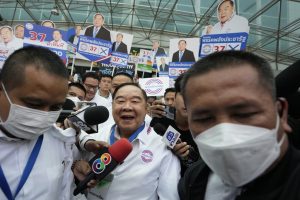Thais will soon head to polls that are set to redefine Thailand’s political landscape. It is against this backdrop that the resilience of Palang Pracharath Party (PPRP), the largest military-backed party in the 2019-2023 coalition government piloted by Gen. Prayut Chan-o-cha, is becoming increasingly questioned.
There are reasons to believe that the PPRP is plunging into an abyss. The party was born with the narrow objective of prolonging the post-2014 Prayut-led military regime, thereby preserving national stability. In the face of the COVID-19 pandemic and widening socioeconomic inequalities, the need to maintain political order has become less of a priority and the PPRP’s sense of purpose has gradually withered away.
Then there is the PPRP’s intense factionalization. Unconcealed infighting has resulted in humiliating local election losses and a flurry of departures. Prayut, though an unofficial member, also left the PPRP’s orbit last December and proceeded to reestablish himself as a main prime ministerial candidate of the ultraconservative United Thai Nation Party. Prayut may seem unpopular, but he still commands a loyal fanbase. Besides, he will probably win more support from retired citizens thanks to his welfare boost election pledge.
Blatant party switching is a common feature of Thai politics. Still, the PPRP has probably lost more members than any other party. Last month, the PPRP parted ways with its key executive members Suriya Juangroongruangkit and Somsak Thepsutin; the former served as industry minister and the latter as justice minister in the Prayut cabinet. Utilizing their old connections, both men quickly joined the main opposition Pheu Thai Party (PTP) and, quite funnily, publicly criticized the Prayut administration that they had worked with for steering Thailand into an economic crash.
Many lower-ranked ex-PPRP MPs, meanwhile, have defected to the “weed party,” Bhumjaithai. As I have previously observed, Bhumjaithai is on course to win big in the fast-approaching May 14 election.
Further amplifying the perception that the PPRP is in a terminal decline, its leader and sole prime ministerial candidate, Gen. Prawit Wongsuwan, is generally considered by ordinary Thais to be “unfit to lead.” Opinion polls consistently see Prawit trailing far behind other contenders, even those from smaller parties. While the reliability of these polls is debatable, it is safe to say that Prawit’s frail health and past scandal involving luxury watches have greatly weakened his standing.
The PPRP certainly recognizes these realities and has ramped up political reorientation efforts to maximize its chances of survival, disentangling itself from Prayut and campaigning for reconciliation under a new slogan “step beyond conflict.” The narrative of a “third way” between conservatism and reformism is nothing new. Parties like Chart Pattana Kla and Thai Sang Thai, for instance, have attempted to strike a balance between the two competing camps. Yet these middle-sized parties focus primarily on the economic aspect and lack the capacity to make meaningful changes. Their chances to shine are further undermined by the new electoral system that only favors large parties.
In contrast, Prawit talks explicitly about Thailand’s perpetual political divide, civil-military relations, and the party’s readiness to move beyond a zero-sum game by working with representatives from all sides. As a veteran kingmaker with more friends than foes, Prawit does have some credibility to act on this bold declaration.
Prawit has made quite a few interesting moves in recent weeks. First, he has increasingly engaged in conversations with university students, many of whom are anti-military. He also had a friendly interview with a hardline pro-democracy activist Patsaravalee “Mind” Tanakitvibulpon. A year ago, this would have been an unthinkable encounter. Moreover, amid debates on whether Thailand’s premier must be an MP (each party can now nominate up to three candidates and they are not required to run for House seats), Prawit became the PPRP’s number one party-list candidate. In a statement announcing his candidacy, Prawit expressed a desire to rise gracefully as a leader with public approval – a jab to Prayut and the PTP’s top two prime ministerial candidates, Paetongtarn Shinawatra and Srettha Thavisin, who have opted out of running for party-list seats.
It remains to be seen whether Prawit’s unity campaign will convince (undecided and centrist) Thai voters. If it does, Prawit’s role in setting up the new government could be crucial. The election is expected to be closely contested, making a “landslide” victory for any one party unrealistic. Coalition formation, which naturally involves backdoor political deal-making – Prawit’s specialty – is almost a sure thing.
What, then, are the potential coalition models? In a recently published Fulcrum commentary, Napon Jatusripitak and Ken Mathis Lohatepanont outlined three pathways: a continuation of the existing conservative coalition, a liberal-leaning coalition led by current opposition parties, and a pragmatic political fusion. Prawit’s PPRP would be pivotal in building conservative or pragmatic coalitions. These are arguably the more probable outcomes. Forming a full-fledged liberal government will be difficult, if not impossible, due to the power of 250 conservative senators (many believed to be loyal to Prawit) to vote for Thailand’s new leader.
Therefore, despite appearing to be critically wounded, Prawit’s PPRP is still a force to be reckoned with. As some observers predict, Prawit could end up snatching the prime minister post.

































